Love By Proxy: Relying on Fake Relationships
I have a cold today.
I could feel it coming on yesterday, and it sent me early to bed, but today it is full-blown. I’m not gonna lie - I’ve always kind of liked being just a little bit sick. Sick enough to guiltlessly stay in bed playing video games all day (punctuated by naps and plenty of fluids) but not so sick that I can’t enjoy it.
I could play Prototype - the game I’m lately live-tweeting. But when I’m sick, I want a game that takes me to a happy place. Prototype may be a hell of a lot of fun, but it is sure not happy. Alex Mercer’s New York is a hellhole and his life is horrible. I may have a great time behind the controller, but he’s having a terrible one on the screen.
The whole point of escapism is that you escape to a better situation, not a worse one. Prototype is great for blowing off steam, but if I want to bury myself in another existence for a while, to forget about this one and the runny noses that come along with it, I play a game like Star Ocean.
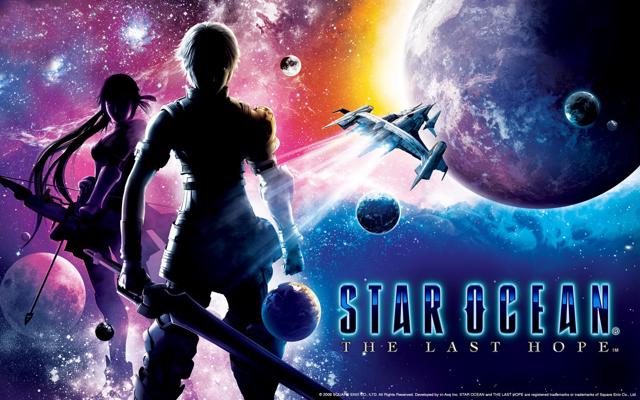
That’s why my birthday present to myself this year was Star Ocean: The Last Hope, which just came out for the PS3, despite the fact that I already rented and beat the Xbox version months ago. It’s such a happy place. I want to be able to hang out with Faize and Bacchus again, to gather herbs with Reimi, to lead Meracle to victory in the Colosseum. Not every day. But whenever I need a pick-me-up.
When you’re sick and contagious, you stay alone. You may wrap yourself up in blankets on a bed or a couch, but unless you’re actually trying to spread infection you stay away from people. It can be lonely. But if you can’t be social, you can at least be parasocial.
“Parasocial relationships are the kind of one sided pseudo-relationships we develop over time with people or characters we might see on TV or in the movies. So, just as a friendship evolves through spending time together and sharing personal thoughts and opinions, parasocial relationships evolve by watching characters on our favorite TV shows, and becoming involved with their personal lives, idiosyncrasies, and experiences as if they were those of a friend.”
—Fionnuala Butler and Cynthia Pickett, Imaginary Friends
The human brain is remarkably easy to fool. It turns out that parasocial relationships are a surprisingly effective substitute for social interaction and acceptance, and can protect against loneliness.
“A common experience following a threat to interpersonal relationships, such as a fight, or social rejection, is lowered self-esteem and negative mood. However, the researchers found that those participants who experienced a relationship threat and then watched their favorite TV show were buffered against the blow to self-esteem, negative mood, and feelings of rejection.”
—Fionnuala Butler and Cynthia Pickett, Imaginary Friends
The effects may even be stronger with video games, due to the players having agency. Instead of just watching the characters, the players actually interact with them. Prototype’s Alex Mercer? Not somebody I’d want to hang out with. The crew of Star Ocean’s Calnus? Yes, please.
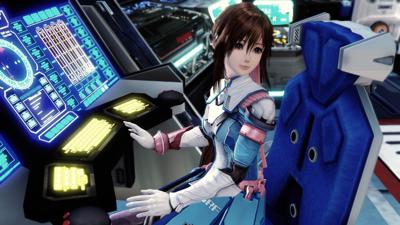
When I think of video game happy places, and large groups of characters I’d want to spend time with, I mostly think of RPGs - Japanese ones in particular. In action games, it’s common for the hero to be alone. But in many RPGs, gathering the party members is a major part of the game. Building a well-balanced group in which each teammate supports the others is key to success. When your characters’ bonds are forged in battle, when they stand as equals who rely on each other for survival, some of the intensity of their closeness, trust, and respect inevitably transfers over to the player’s parasocial experience.
In the end, of course, even the best substitute is still just a substitute. No matter how well-crafted the narrative, no matter how flexible and believable the interaction, no matter how convincing the illusion, it remains an illusion.
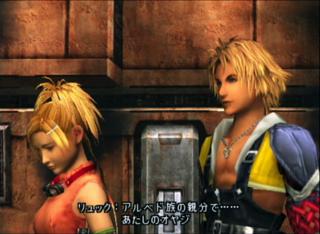
“Hey, Rikku! It’s me, Tidus!” I said, identifying myself as the game’s hero - the character through which I’d interacted with Rikku.
Rikku looked at me, bored, and sighed. “I have met so many with equal claim to that name,” she said, and with a sweep of her hand indicated a group of people, some of whom I recognized as friends of mine, who’d all played Final Fantasy X. Some were clustered around a PS2 playing it right then. Then she turned and walked away.
The dream laid bare the one-sided emptiness of the parasocial relationships I’d been enjoying without really analyzing - at least not consciously. Seeing the illusion for what it was made me leery, and I’ve been much more careful and self-aware about these things ever since.

“Works in the dating sim genre are typically referred to as ‘Girl Get’ games. The emphasis is on the ‘get’. Once you ‘get’ the girl, typically, the game is pretty much over. ‘Girl Get’ is a much better genre distinction than ‘dating sim’. Love Plus is a dating sim. Once you ‘get’ the girl via ten or so hours of grueling menu-mashing, you earn the option to flip the game into ‘real-time mode’. The game gives you ‘action points’ to use to perform actions of your choosing — you have a wide variety of options, from calling your girl to sending her a ‘what’s up’ email to scheduling a date. You can even choose the location of the date: zoo, movie, park, shopping mall. Then you have to make sure to turn the game on at the right time to attend your date. Turn the game on before bed and give the girl a phone call to tell her goodnight, et cetera.”
—Tim Rogers, can videogames be our friends?
It’s not as though there’s any shortage of actual women in the world. But for a lot of men, it’s very hard to talk to women. In fact, interacting with women makes men stupid - the more attractive the woman, the stupider the man becomes. It’s enough of an issue that we see releases of games like Don’t B Nervous Talking 2 Girls, an Xbox Live Arcade indie game that purports to teach the player to talk to women.
As technology and design improve, and parasocial romance becomes more and more sophisticated, while real live women remain as intimidating as ever, more and more men will abandon reality in favor of a substitute. There is, in fact, a movement of men who find no shame in thoroughly embracing parasocial romance - or as they call it, “2-D love.”
“The less extreme might have a hidden collection of figurines based on anime characters that they go on ‘dates’ with during off hours. A more serious 2-D lover… actually believes that a lumpy pillow with a drawing of a prepubescent anime character on it is his girlfriend.
According to many who study the phenomenon, the rise of 2-D love can be attributed in part to the difficulty many young Japanese have in navigating modern romantic life. According to a government survey, more than a quarter of unmarried men and women between the ages of 30 and 34 are virgins; 50 percent of men and women in Japan said they were not ‘going out with anybody’. . . .
A few years ago, [Toru] Honda… began to use the Internet to urge otaku to stand with pride against good-looking men and women. His site generated enough buzz to earn him a publishing contract, and in 2005 he released a book condemning what he calls ‘romantic capitalism.’ Honda argues that romance was marketed so excessively through B-movies, soap operas and novels during Japan’s economic bubble of the ’80s that it has become a commodity and its true value has been lost; romance is so tainted with social constructs that it can be bought by only good looks and money. According to Honda, somewhere along the way, decent men like himself lost interest in the notion entirely and turned to 2-D. ‘Pure love is completely gone in the real world,’ Honda wrote. ‘As long as you train your imagination, a 2-D relationship is much more passionate than a 3-D one.’ Honda insists that he’s advocating not prurience but a whole new kind of romance. If, as some researchers suggest, romantic love can be broken down into electrical impulses in the brain, then why not train the mind to simulate those signals while looking at an inanimate character?”
—Lisa Katayama, Love in 2-D
“As long as you train your imagination.” This is the key phrase. These men are making a conscious decision to disconnect from reality. They aren’t being fooled. They are making themselves believe.
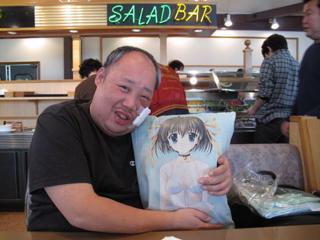
When it comes to the difficulties of real-life romance, suppressing the part of the brain that can tell the difference between genuine human interaction and parasocial relationships must be considered an extreme response.
“When [Toru Honda] admitted to watching human porn at a panel discussion in Tokyo in 2005, several hundred hard-core 2-D lovers in the audience booed with shock that their dear leader had nostalgia for the 3-D world. Later, in an interview with a Japanese newspaper, Honda clarified his position, saying that he was worried 2-D love was becoming an easy way out for young otaku, who might still have a shot at success in the real world. ‘I’m not saying that everyone should throw away hopes of real romance right away. I am simply saying that guys like me who have gotten to a point of no return can be happy living in 2-D.’”
—Lisa Katayama, Love in 2-D
Once someone has trained themselves to accept fantasy as a viable substitute for reality, it’s very difficult to reverse course. (I had a hard enough time backing off of my reliance on fake achievement, and I hadn’t even latched onto that on purpose.) Reality is harder than fantasy. It includes possibilities of unrecoverable failure, of rejection and restraining orders, of genuinely harming another human being. The rewards are greater, too - but if your worldview is tweaked to the point where those rewards hold no appeal over those of fantasy, why bother with the pain? How could you ever be talked back from the edge, once you’ve already hurled yourself into the abyss?
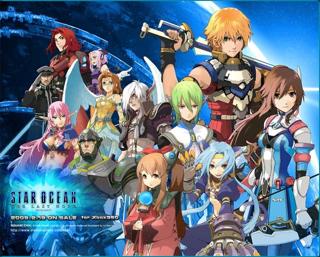
Sooner or later, I beat the game. Like its predecessors, this Star Ocean has a great deal of content after the end boss - bonus dungeons and so on - but none of it is character driven. There are no more plot scenes and dialogs. The combat and related mechanics are deep and fun, but without the characters interacting with each other, it just feels empty. It’s just going through the motions. The love is gone from the relationship.
So I put the game down. Until the next time I get a cold. Then all bets are off.